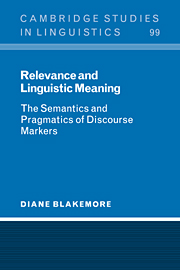
-
Select format
-
- Publisher:
- Cambridge University Press
- Publication date:
- December 2009
- September 2002
- ISBN:
- 9780511486456
- 9780521640077
- 9780521607711
- Dimensions:
- (228 x 152 mm)
- Weight & Pages:
- 0.48kg, 212 Pages
- Dimensions:
- (228 x 152 mm)
- Weight & Pages:
- 0.32kg, 212 Pages
You may already have access via personal or institutional login
Book description
The importance of discourse markers (words like 'so', 'however', and 'well') lies in the theoretical questions they raise about the nature of discourse and the relationship between linguistic meaning and context. They are regarded as being central to semantics because they raise problems for standard theories of meaning, and to pragmatics because they seem to play a role in the way discourse is understood. In this new and important study, Diane Blakemore argues that attempts to analyse these expressions within standard semantic frameworks raise even more problems, while their analysis as expressions that link segments of discourse has led to an unproductive and confusing exercise in classification. She concludes that the exercise in classification that has dominated discourse marker research should be replaced by the investigation of the way in which linguistic expressions contribute to the inferential processes involved in utterance understanding.
Reviews
‘Relevance and Linguistic Meaning raises a number of interesting and important issues … it is a well-structured and accessibly written book …’.
Source: Acta Linguistica Hafniensia
Contents
Metrics
Altmetric attention score
Full text views
Full text views help Loading metrics...
Loading metrics...
* Views captured on Cambridge Core between #date#. This data will be updated every 24 hours.
Usage data cannot currently be displayed.
Accessibility standard: Unknown
Why this information is here
This section outlines the accessibility features of this content - including support for screen readers, full keyboard navigation and high-contrast display options. This may not be relevant for you.
Accessibility Information
Accessibility compliance for the PDF of this book is currently unknown and may be updated in the future.


